Clinical Project: Reflective Journal on Key Nursing Themes
VerifiedAdded on 2023/04/21
|10
|2557
|243
Journal and Reflective Writing
AI Summary
This reflective journal delves into the author's experiences during a clinical placement, focusing on four significant events analyzed through Gibbs' reflective framework. These events include navigating an ethical dilemma involving a patient's request to discontinue treatment, addressing poor teamwork within a multidisciplinary team, recognizing the importance of effective patient communication after a negative patient feedback, and successfully educating a patient about managing a heart disorder. The reflection highlights initial confidence followed by realizations of knowledge and skill gaps, particularly in ethical decision-making, communication, and teamwork. The author acknowledges the importance of ethical principles, therapeutic communication, and collaborative teamwork in ensuring positive patient outcomes. The journal concludes with an action plan to enhance skills in these areas through workshops, case studies, and discussions, aiming to become a proficient and well-rounded nursing professional. Desklib provides access to similar solved assignments and resources for students.
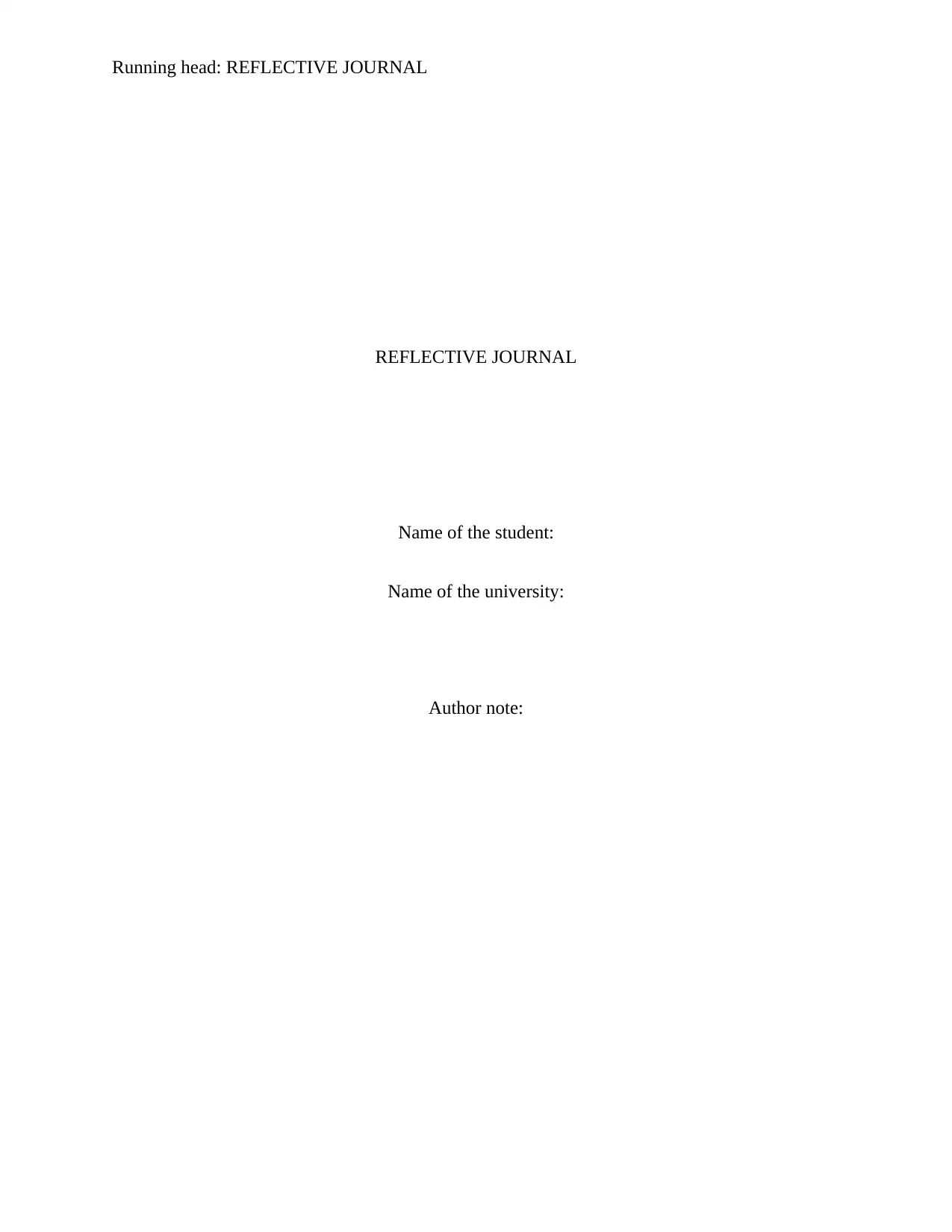
Running head: REFLECTIVE JOURNAL
REFLECTIVE JOURNAL
Name of the student:
Name of the university:
Author note:
REFLECTIVE JOURNAL
Name of the student:
Name of the university:
Author note:
Paraphrase This Document
Need a fresh take? Get an instant paraphrase of this document with our AI Paraphraser
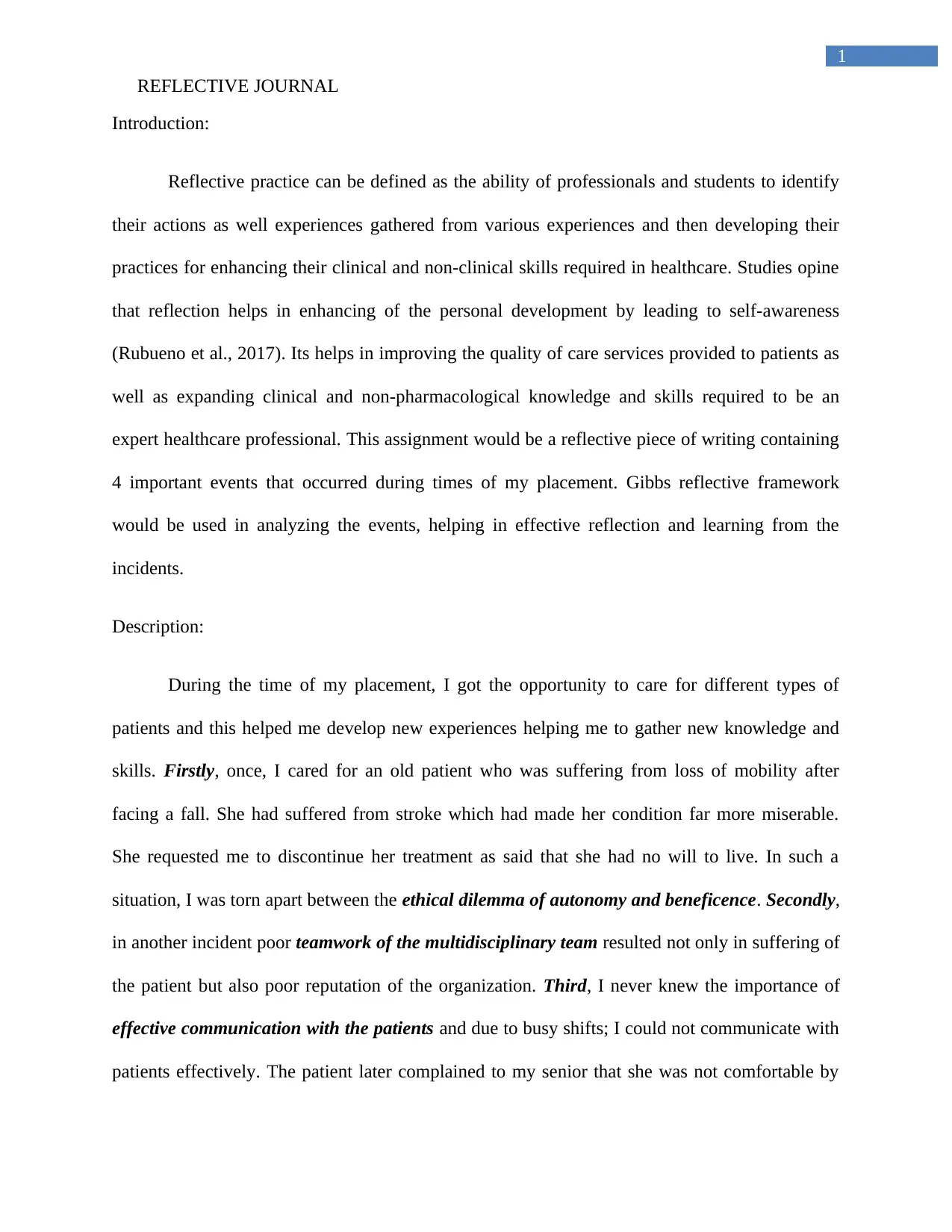
1
REFLECTIVE JOURNAL
Introduction:
Reflective practice can be defined as the ability of professionals and students to identify
their actions as well experiences gathered from various experiences and then developing their
practices for enhancing their clinical and non-clinical skills required in healthcare. Studies opine
that reflection helps in enhancing of the personal development by leading to self-awareness
(Rubueno et al., 2017). Its helps in improving the quality of care services provided to patients as
well as expanding clinical and non-pharmacological knowledge and skills required to be an
expert healthcare professional. This assignment would be a reflective piece of writing containing
4 important events that occurred during times of my placement. Gibbs reflective framework
would be used in analyzing the events, helping in effective reflection and learning from the
incidents.
Description:
During the time of my placement, I got the opportunity to care for different types of
patients and this helped me develop new experiences helping me to gather new knowledge and
skills. Firstly, once, I cared for an old patient who was suffering from loss of mobility after
facing a fall. She had suffered from stroke which had made her condition far more miserable.
She requested me to discontinue her treatment as said that she had no will to live. In such a
situation, I was torn apart between the ethical dilemma of autonomy and beneficence. Secondly,
in another incident poor teamwork of the multidisciplinary team resulted not only in suffering of
the patient but also poor reputation of the organization. Third, I never knew the importance of
effective communication with the patients and due to busy shifts; I could not communicate with
patients effectively. The patient later complained to my senior that she was not comfortable by
REFLECTIVE JOURNAL
Introduction:
Reflective practice can be defined as the ability of professionals and students to identify
their actions as well experiences gathered from various experiences and then developing their
practices for enhancing their clinical and non-clinical skills required in healthcare. Studies opine
that reflection helps in enhancing of the personal development by leading to self-awareness
(Rubueno et al., 2017). Its helps in improving the quality of care services provided to patients as
well as expanding clinical and non-pharmacological knowledge and skills required to be an
expert healthcare professional. This assignment would be a reflective piece of writing containing
4 important events that occurred during times of my placement. Gibbs reflective framework
would be used in analyzing the events, helping in effective reflection and learning from the
incidents.
Description:
During the time of my placement, I got the opportunity to care for different types of
patients and this helped me develop new experiences helping me to gather new knowledge and
skills. Firstly, once, I cared for an old patient who was suffering from loss of mobility after
facing a fall. She had suffered from stroke which had made her condition far more miserable.
She requested me to discontinue her treatment as said that she had no will to live. In such a
situation, I was torn apart between the ethical dilemma of autonomy and beneficence. Secondly,
in another incident poor teamwork of the multidisciplinary team resulted not only in suffering of
the patient but also poor reputation of the organization. Third, I never knew the importance of
effective communication with the patients and due to busy shifts; I could not communicate with
patients effectively. The patient later complained to my senior that she was not comfortable by
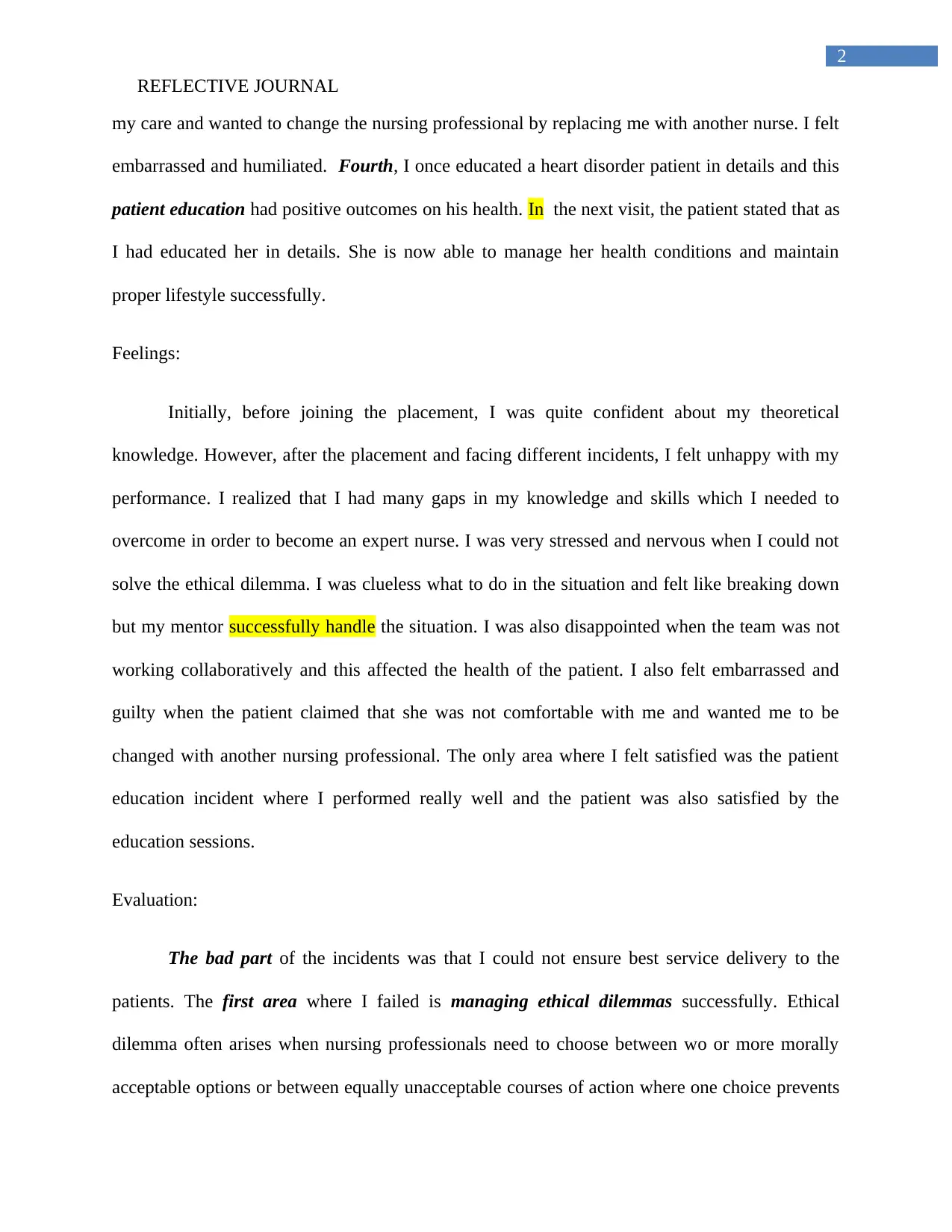
2
REFLECTIVE JOURNAL
my care and wanted to change the nursing professional by replacing me with another nurse. I felt
embarrassed and humiliated. Fourth, I once educated a heart disorder patient in details and this
patient education had positive outcomes on his health. In the next visit, the patient stated that as
I had educated her in details. She is now able to manage her health conditions and maintain
proper lifestyle successfully.
Feelings:
Initially, before joining the placement, I was quite confident about my theoretical
knowledge. However, after the placement and facing different incidents, I felt unhappy with my
performance. I realized that I had many gaps in my knowledge and skills which I needed to
overcome in order to become an expert nurse. I was very stressed and nervous when I could not
solve the ethical dilemma. I was clueless what to do in the situation and felt like breaking down
but my mentor successfully handle the situation. I was also disappointed when the team was not
working collaboratively and this affected the health of the patient. I also felt embarrassed and
guilty when the patient claimed that she was not comfortable with me and wanted me to be
changed with another nursing professional. The only area where I felt satisfied was the patient
education incident where I performed really well and the patient was also satisfied by the
education sessions.
Evaluation:
The bad part of the incidents was that I could not ensure best service delivery to the
patients. The first area where I failed is managing ethical dilemmas successfully. Ethical
dilemma often arises when nursing professionals need to choose between wo or more morally
acceptable options or between equally unacceptable courses of action where one choice prevents
REFLECTIVE JOURNAL
my care and wanted to change the nursing professional by replacing me with another nurse. I felt
embarrassed and humiliated. Fourth, I once educated a heart disorder patient in details and this
patient education had positive outcomes on his health. In the next visit, the patient stated that as
I had educated her in details. She is now able to manage her health conditions and maintain
proper lifestyle successfully.
Feelings:
Initially, before joining the placement, I was quite confident about my theoretical
knowledge. However, after the placement and facing different incidents, I felt unhappy with my
performance. I realized that I had many gaps in my knowledge and skills which I needed to
overcome in order to become an expert nurse. I was very stressed and nervous when I could not
solve the ethical dilemma. I was clueless what to do in the situation and felt like breaking down
but my mentor successfully handle the situation. I was also disappointed when the team was not
working collaboratively and this affected the health of the patient. I also felt embarrassed and
guilty when the patient claimed that she was not comfortable with me and wanted me to be
changed with another nursing professional. The only area where I felt satisfied was the patient
education incident where I performed really well and the patient was also satisfied by the
education sessions.
Evaluation:
The bad part of the incidents was that I could not ensure best service delivery to the
patients. The first area where I failed is managing ethical dilemmas successfully. Ethical
dilemma often arises when nursing professionals need to choose between wo or more morally
acceptable options or between equally unacceptable courses of action where one choice prevents
⊘ This is a preview!⊘
Do you want full access?
Subscribe today to unlock all pages.

Trusted by 1+ million students worldwide
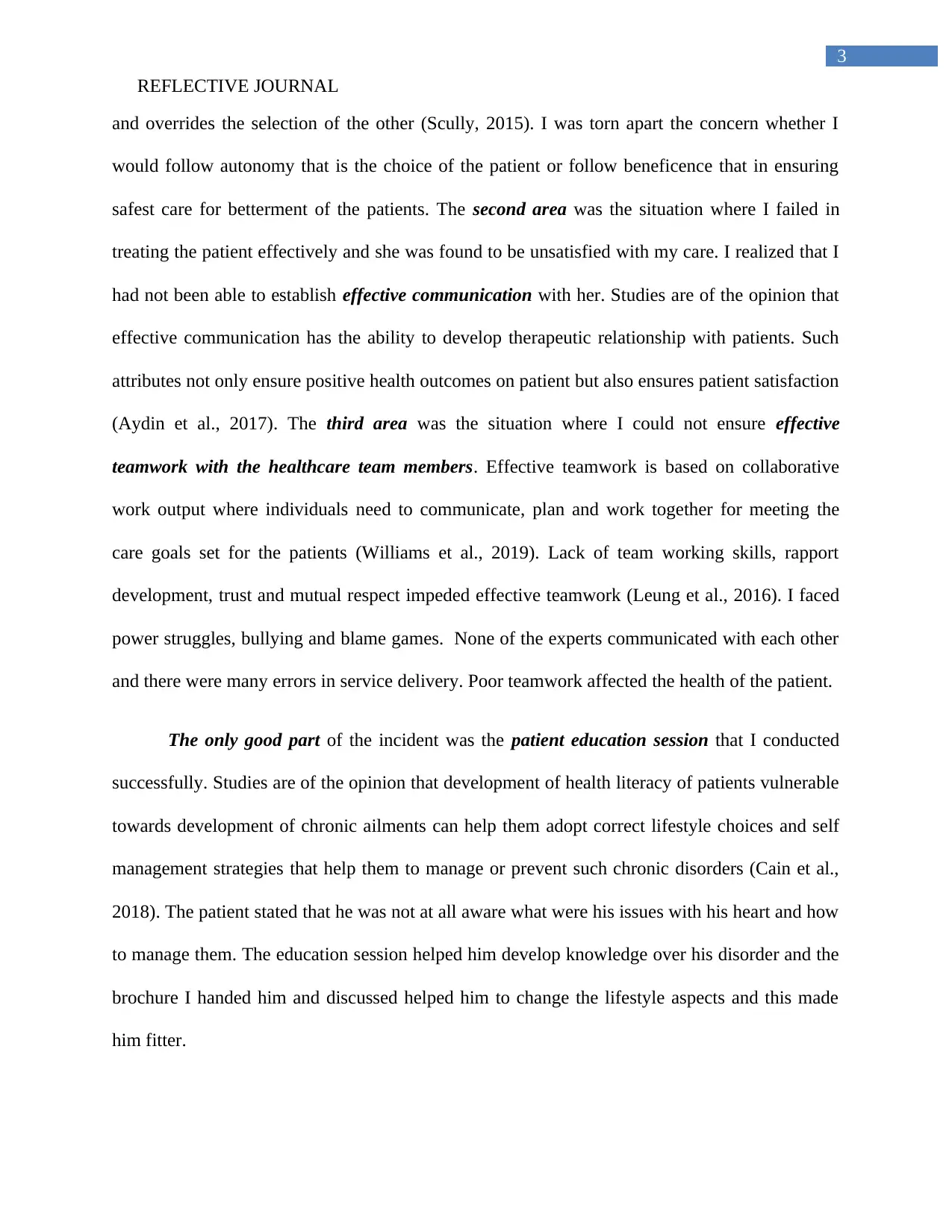
3
REFLECTIVE JOURNAL
and overrides the selection of the other (Scully, 2015). I was torn apart the concern whether I
would follow autonomy that is the choice of the patient or follow beneficence that in ensuring
safest care for betterment of the patients. The second area was the situation where I failed in
treating the patient effectively and she was found to be unsatisfied with my care. I realized that I
had not been able to establish effective communication with her. Studies are of the opinion that
effective communication has the ability to develop therapeutic relationship with patients. Such
attributes not only ensure positive health outcomes on patient but also ensures patient satisfaction
(Aydin et al., 2017). The third area was the situation where I could not ensure effective
teamwork with the healthcare team members. Effective teamwork is based on collaborative
work output where individuals need to communicate, plan and work together for meeting the
care goals set for the patients (Williams et al., 2019). Lack of team working skills, rapport
development, trust and mutual respect impeded effective teamwork (Leung et al., 2016). I faced
power struggles, bullying and blame games. None of the experts communicated with each other
and there were many errors in service delivery. Poor teamwork affected the health of the patient.
The only good part of the incident was the patient education session that I conducted
successfully. Studies are of the opinion that development of health literacy of patients vulnerable
towards development of chronic ailments can help them adopt correct lifestyle choices and self
management strategies that help them to manage or prevent such chronic disorders (Cain et al.,
2018). The patient stated that he was not at all aware what were his issues with his heart and how
to manage them. The education session helped him develop knowledge over his disorder and the
brochure I handed him and discussed helped him to change the lifestyle aspects and this made
him fitter.
REFLECTIVE JOURNAL
and overrides the selection of the other (Scully, 2015). I was torn apart the concern whether I
would follow autonomy that is the choice of the patient or follow beneficence that in ensuring
safest care for betterment of the patients. The second area was the situation where I failed in
treating the patient effectively and she was found to be unsatisfied with my care. I realized that I
had not been able to establish effective communication with her. Studies are of the opinion that
effective communication has the ability to develop therapeutic relationship with patients. Such
attributes not only ensure positive health outcomes on patient but also ensures patient satisfaction
(Aydin et al., 2017). The third area was the situation where I could not ensure effective
teamwork with the healthcare team members. Effective teamwork is based on collaborative
work output where individuals need to communicate, plan and work together for meeting the
care goals set for the patients (Williams et al., 2019). Lack of team working skills, rapport
development, trust and mutual respect impeded effective teamwork (Leung et al., 2016). I faced
power struggles, bullying and blame games. None of the experts communicated with each other
and there were many errors in service delivery. Poor teamwork affected the health of the patient.
The only good part of the incident was the patient education session that I conducted
successfully. Studies are of the opinion that development of health literacy of patients vulnerable
towards development of chronic ailments can help them adopt correct lifestyle choices and self
management strategies that help them to manage or prevent such chronic disorders (Cain et al.,
2018). The patient stated that he was not at all aware what were his issues with his heart and how
to manage them. The education session helped him develop knowledge over his disorder and the
brochure I handed him and discussed helped him to change the lifestyle aspects and this made
him fitter.
Paraphrase This Document
Need a fresh take? Get an instant paraphrase of this document with our AI Paraphraser
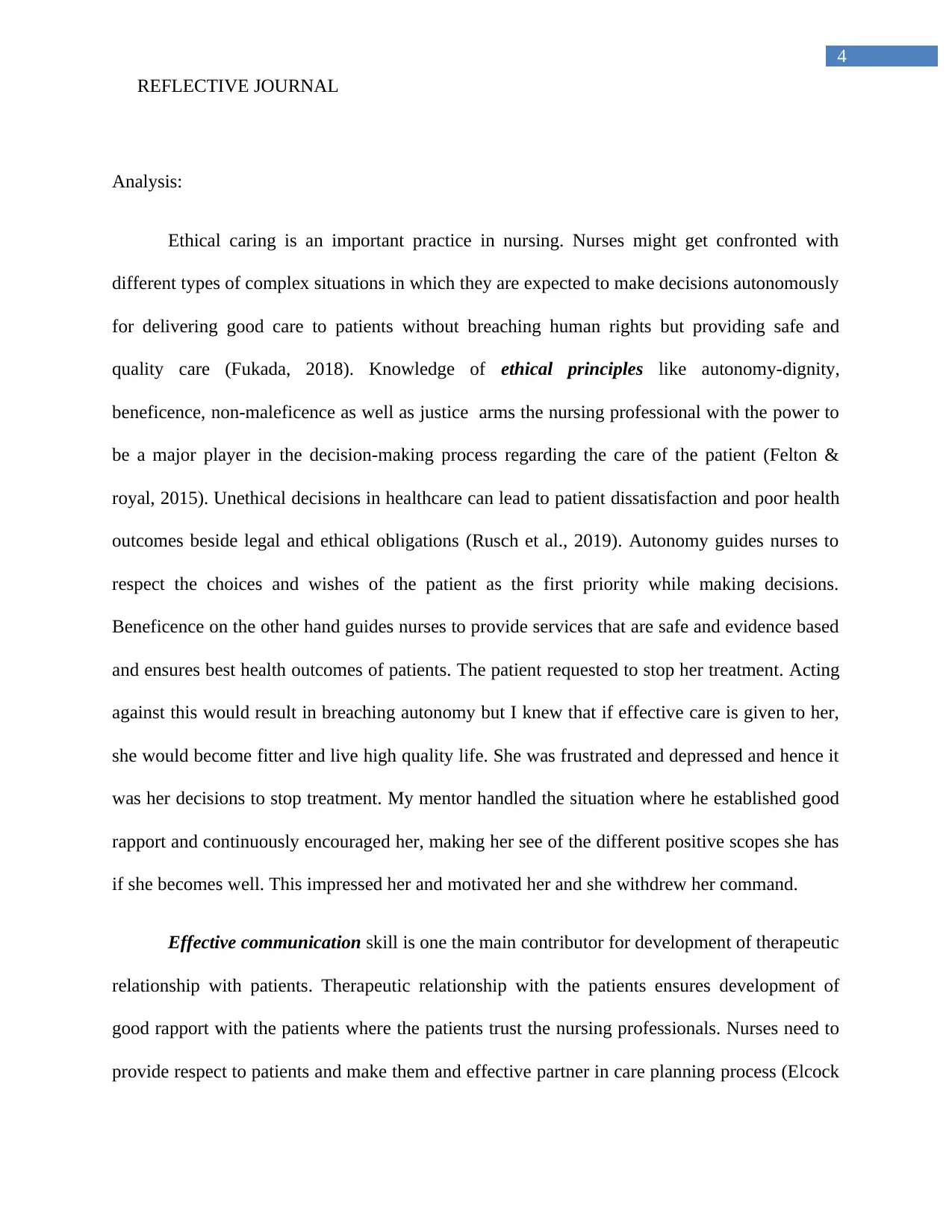
4
REFLECTIVE JOURNAL
Analysis:
Ethical caring is an important practice in nursing. Nurses might get confronted with
different types of complex situations in which they are expected to make decisions autonomously
for delivering good care to patients without breaching human rights but providing safe and
quality care (Fukada, 2018). Knowledge of ethical principles like autonomy-dignity,
beneficence, non-maleficence as well as justice arms the nursing professional with the power to
be a major player in the decision-making process regarding the care of the patient (Felton &
royal, 2015). Unethical decisions in healthcare can lead to patient dissatisfaction and poor health
outcomes beside legal and ethical obligations (Rusch et al., 2019). Autonomy guides nurses to
respect the choices and wishes of the patient as the first priority while making decisions.
Beneficence on the other hand guides nurses to provide services that are safe and evidence based
and ensures best health outcomes of patients. The patient requested to stop her treatment. Acting
against this would result in breaching autonomy but I knew that if effective care is given to her,
she would become fitter and live high quality life. She was frustrated and depressed and hence it
was her decisions to stop treatment. My mentor handled the situation where he established good
rapport and continuously encouraged her, making her see of the different positive scopes she has
if she becomes well. This impressed her and motivated her and she withdrew her command.
Effective communication skill is one the main contributor for development of therapeutic
relationship with patients. Therapeutic relationship with the patients ensures development of
good rapport with the patients where the patients trust the nursing professionals. Nurses need to
provide respect to patients and make them and effective partner in care planning process (Elcock
REFLECTIVE JOURNAL
Analysis:
Ethical caring is an important practice in nursing. Nurses might get confronted with
different types of complex situations in which they are expected to make decisions autonomously
for delivering good care to patients without breaching human rights but providing safe and
quality care (Fukada, 2018). Knowledge of ethical principles like autonomy-dignity,
beneficence, non-maleficence as well as justice arms the nursing professional with the power to
be a major player in the decision-making process regarding the care of the patient (Felton &
royal, 2015). Unethical decisions in healthcare can lead to patient dissatisfaction and poor health
outcomes beside legal and ethical obligations (Rusch et al., 2019). Autonomy guides nurses to
respect the choices and wishes of the patient as the first priority while making decisions.
Beneficence on the other hand guides nurses to provide services that are safe and evidence based
and ensures best health outcomes of patients. The patient requested to stop her treatment. Acting
against this would result in breaching autonomy but I knew that if effective care is given to her,
she would become fitter and live high quality life. She was frustrated and depressed and hence it
was her decisions to stop treatment. My mentor handled the situation where he established good
rapport and continuously encouraged her, making her see of the different positive scopes she has
if she becomes well. This impressed her and motivated her and she withdrew her command.
Effective communication skill is one the main contributor for development of therapeutic
relationship with patients. Therapeutic relationship with the patients ensures development of
good rapport with the patients where the patients trust the nursing professionals. Nurses need to
provide respect to patients and make them and effective partner in care planning process (Elcock
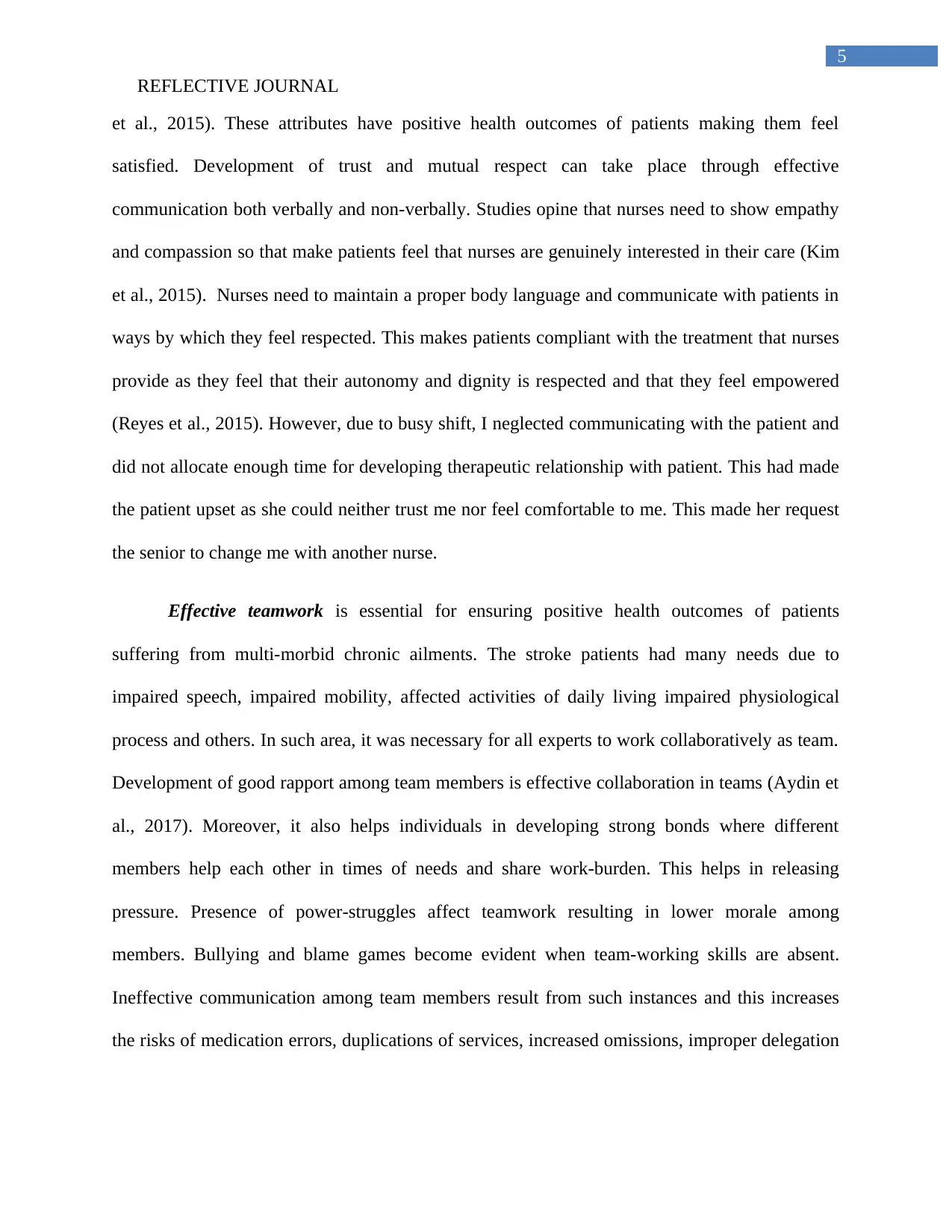
5
REFLECTIVE JOURNAL
et al., 2015). These attributes have positive health outcomes of patients making them feel
satisfied. Development of trust and mutual respect can take place through effective
communication both verbally and non-verbally. Studies opine that nurses need to show empathy
and compassion so that make patients feel that nurses are genuinely interested in their care (Kim
et al., 2015). Nurses need to maintain a proper body language and communicate with patients in
ways by which they feel respected. This makes patients compliant with the treatment that nurses
provide as they feel that their autonomy and dignity is respected and that they feel empowered
(Reyes et al., 2015). However, due to busy shift, I neglected communicating with the patient and
did not allocate enough time for developing therapeutic relationship with patient. This had made
the patient upset as she could neither trust me nor feel comfortable to me. This made her request
the senior to change me with another nurse.
Effective teamwork is essential for ensuring positive health outcomes of patients
suffering from multi-morbid chronic ailments. The stroke patients had many needs due to
impaired speech, impaired mobility, affected activities of daily living impaired physiological
process and others. In such area, it was necessary for all experts to work collaboratively as team.
Development of good rapport among team members is effective collaboration in teams (Aydin et
al., 2017). Moreover, it also helps individuals in developing strong bonds where different
members help each other in times of needs and share work-burden. This helps in releasing
pressure. Presence of power-struggles affect teamwork resulting in lower morale among
members. Bullying and blame games become evident when team-working skills are absent.
Ineffective communication among team members result from such instances and this increases
the risks of medication errors, duplications of services, increased omissions, improper delegation
REFLECTIVE JOURNAL
et al., 2015). These attributes have positive health outcomes of patients making them feel
satisfied. Development of trust and mutual respect can take place through effective
communication both verbally and non-verbally. Studies opine that nurses need to show empathy
and compassion so that make patients feel that nurses are genuinely interested in their care (Kim
et al., 2015). Nurses need to maintain a proper body language and communicate with patients in
ways by which they feel respected. This makes patients compliant with the treatment that nurses
provide as they feel that their autonomy and dignity is respected and that they feel empowered
(Reyes et al., 2015). However, due to busy shift, I neglected communicating with the patient and
did not allocate enough time for developing therapeutic relationship with patient. This had made
the patient upset as she could neither trust me nor feel comfortable to me. This made her request
the senior to change me with another nurse.
Effective teamwork is essential for ensuring positive health outcomes of patients
suffering from multi-morbid chronic ailments. The stroke patients had many needs due to
impaired speech, impaired mobility, affected activities of daily living impaired physiological
process and others. In such area, it was necessary for all experts to work collaboratively as team.
Development of good rapport among team members is effective collaboration in teams (Aydin et
al., 2017). Moreover, it also helps individuals in developing strong bonds where different
members help each other in times of needs and share work-burden. This helps in releasing
pressure. Presence of power-struggles affect teamwork resulting in lower morale among
members. Bullying and blame games become evident when team-working skills are absent.
Ineffective communication among team members result from such instances and this increases
the risks of medication errors, duplications of services, increased omissions, improper delegation
⊘ This is a preview!⊘
Do you want full access?
Subscribe today to unlock all pages.

Trusted by 1+ million students worldwide
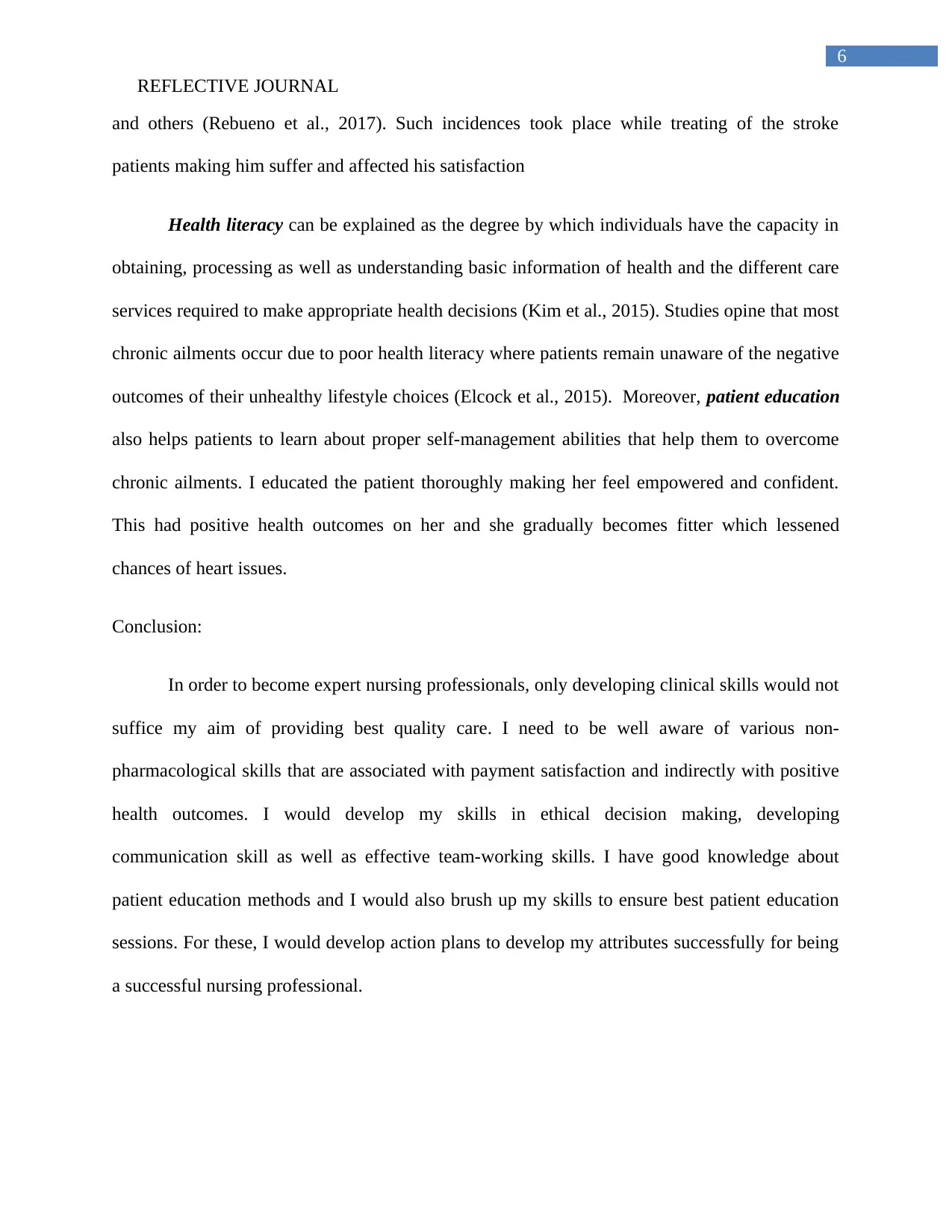
6
REFLECTIVE JOURNAL
and others (Rebueno et al., 2017). Such incidences took place while treating of the stroke
patients making him suffer and affected his satisfaction
Health literacy can be explained as the degree by which individuals have the capacity in
obtaining, processing as well as understanding basic information of health and the different care
services required to make appropriate health decisions (Kim et al., 2015). Studies opine that most
chronic ailments occur due to poor health literacy where patients remain unaware of the negative
outcomes of their unhealthy lifestyle choices (Elcock et al., 2015). Moreover, patient education
also helps patients to learn about proper self-management abilities that help them to overcome
chronic ailments. I educated the patient thoroughly making her feel empowered and confident.
This had positive health outcomes on her and she gradually becomes fitter which lessened
chances of heart issues.
Conclusion:
In order to become expert nursing professionals, only developing clinical skills would not
suffice my aim of providing best quality care. I need to be well aware of various non-
pharmacological skills that are associated with payment satisfaction and indirectly with positive
health outcomes. I would develop my skills in ethical decision making, developing
communication skill as well as effective team-working skills. I have good knowledge about
patient education methods and I would also brush up my skills to ensure best patient education
sessions. For these, I would develop action plans to develop my attributes successfully for being
a successful nursing professional.
REFLECTIVE JOURNAL
and others (Rebueno et al., 2017). Such incidences took place while treating of the stroke
patients making him suffer and affected his satisfaction
Health literacy can be explained as the degree by which individuals have the capacity in
obtaining, processing as well as understanding basic information of health and the different care
services required to make appropriate health decisions (Kim et al., 2015). Studies opine that most
chronic ailments occur due to poor health literacy where patients remain unaware of the negative
outcomes of their unhealthy lifestyle choices (Elcock et al., 2015). Moreover, patient education
also helps patients to learn about proper self-management abilities that help them to overcome
chronic ailments. I educated the patient thoroughly making her feel empowered and confident.
This had positive health outcomes on her and she gradually becomes fitter which lessened
chances of heart issues.
Conclusion:
In order to become expert nursing professionals, only developing clinical skills would not
suffice my aim of providing best quality care. I need to be well aware of various non-
pharmacological skills that are associated with payment satisfaction and indirectly with positive
health outcomes. I would develop my skills in ethical decision making, developing
communication skill as well as effective team-working skills. I have good knowledge about
patient education methods and I would also brush up my skills to ensure best patient education
sessions. For these, I would develop action plans to develop my attributes successfully for being
a successful nursing professional.
Paraphrase This Document
Need a fresh take? Get an instant paraphrase of this document with our AI Paraphraser
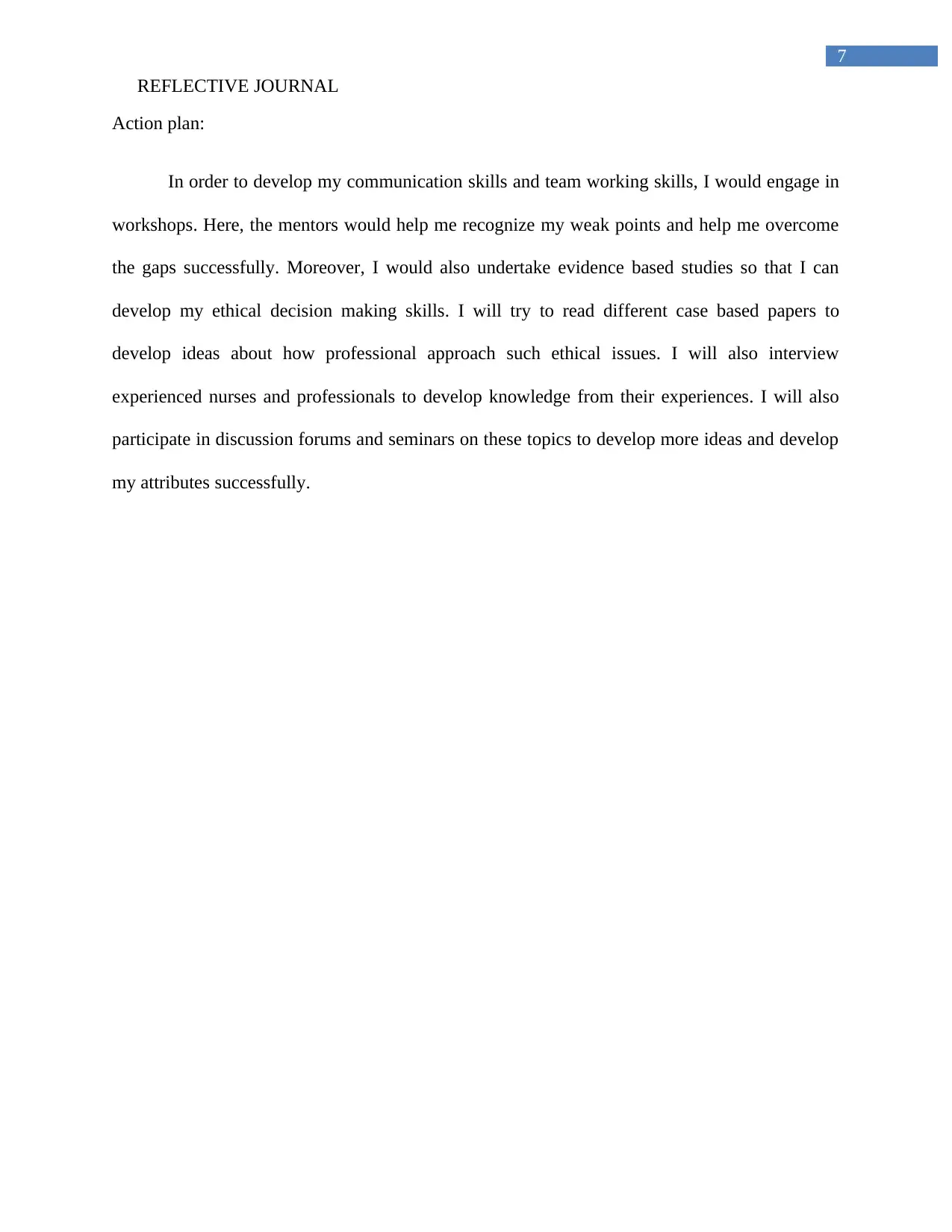
7
REFLECTIVE JOURNAL
Action plan:
In order to develop my communication skills and team working skills, I would engage in
workshops. Here, the mentors would help me recognize my weak points and help me overcome
the gaps successfully. Moreover, I would also undertake evidence based studies so that I can
develop my ethical decision making skills. I will try to read different case based papers to
develop ideas about how professional approach such ethical issues. I will also interview
experienced nurses and professionals to develop knowledge from their experiences. I will also
participate in discussion forums and seminars on these topics to develop more ideas and develop
my attributes successfully.
REFLECTIVE JOURNAL
Action plan:
In order to develop my communication skills and team working skills, I would engage in
workshops. Here, the mentors would help me recognize my weak points and help me overcome
the gaps successfully. Moreover, I would also undertake evidence based studies so that I can
develop my ethical decision making skills. I will try to read different case based papers to
develop ideas about how professional approach such ethical issues. I will also interview
experienced nurses and professionals to develop knowledge from their experiences. I will also
participate in discussion forums and seminars on these topics to develop more ideas and develop
my attributes successfully.
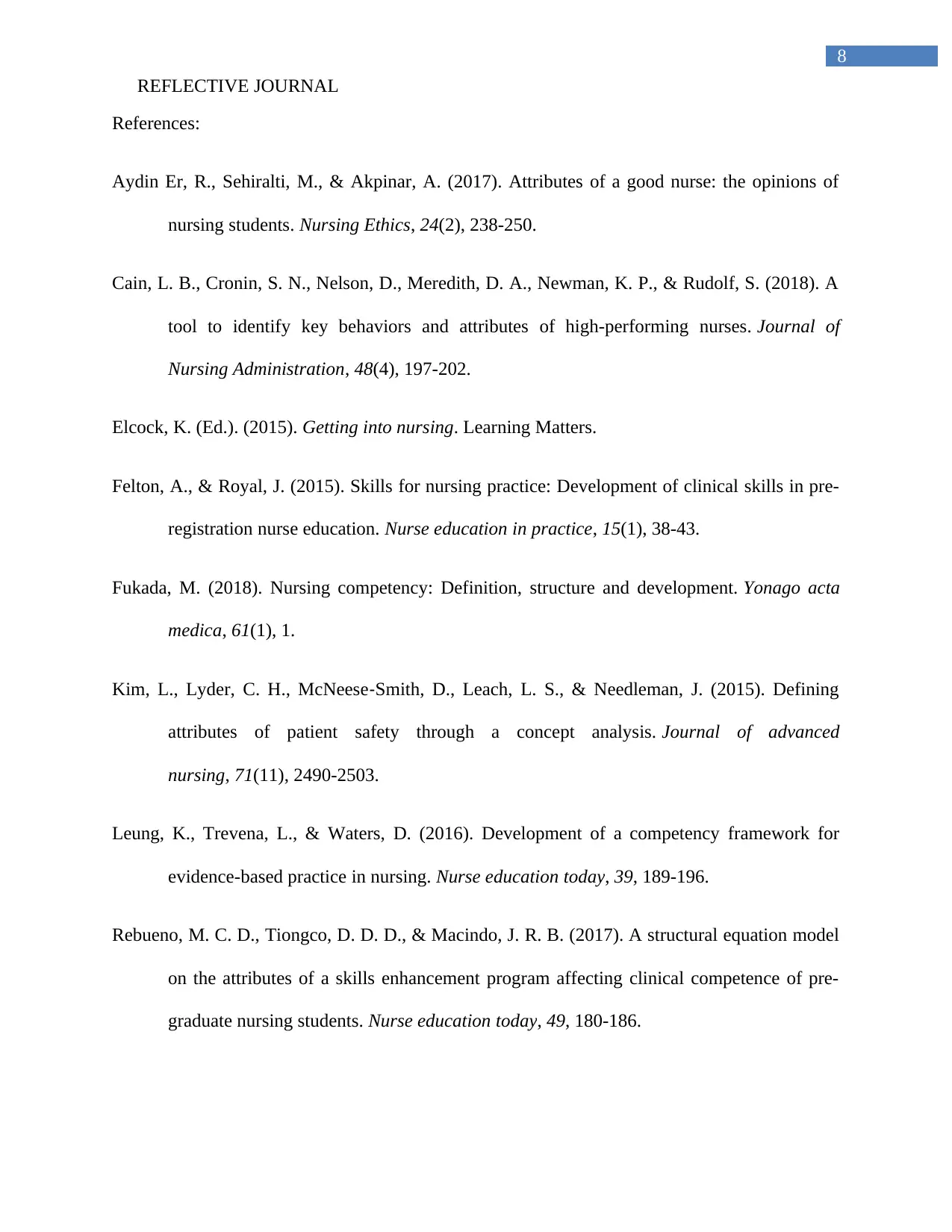
8
REFLECTIVE JOURNAL
References:
Aydin Er, R., Sehiralti, M., & Akpinar, A. (2017). Attributes of a good nurse: the opinions of
nursing students. Nursing Ethics, 24(2), 238-250.
Cain, L. B., Cronin, S. N., Nelson, D., Meredith, D. A., Newman, K. P., & Rudolf, S. (2018). A
tool to identify key behaviors and attributes of high-performing nurses. Journal of
Nursing Administration, 48(4), 197-202.
Elcock, K. (Ed.). (2015). Getting into nursing. Learning Matters.
Felton, A., & Royal, J. (2015). Skills for nursing practice: Development of clinical skills in pre-
registration nurse education. Nurse education in practice, 15(1), 38-43.
Fukada, M. (2018). Nursing competency: Definition, structure and development. Yonago acta
medica, 61(1), 1.
Kim, L., Lyder, C. H., McNeese‐Smith, D., Leach, L. S., & Needleman, J. (2015). Defining
attributes of patient safety through a concept analysis. Journal of advanced
nursing, 71(11), 2490-2503.
Leung, K., Trevena, L., & Waters, D. (2016). Development of a competency framework for
evidence-based practice in nursing. Nurse education today, 39, 189-196.
Rebueno, M. C. D., Tiongco, D. D. D., & Macindo, J. R. B. (2017). A structural equation model
on the attributes of a skills enhancement program affecting clinical competence of pre-
graduate nursing students. Nurse education today, 49, 180-186.
REFLECTIVE JOURNAL
References:
Aydin Er, R., Sehiralti, M., & Akpinar, A. (2017). Attributes of a good nurse: the opinions of
nursing students. Nursing Ethics, 24(2), 238-250.
Cain, L. B., Cronin, S. N., Nelson, D., Meredith, D. A., Newman, K. P., & Rudolf, S. (2018). A
tool to identify key behaviors and attributes of high-performing nurses. Journal of
Nursing Administration, 48(4), 197-202.
Elcock, K. (Ed.). (2015). Getting into nursing. Learning Matters.
Felton, A., & Royal, J. (2015). Skills for nursing practice: Development of clinical skills in pre-
registration nurse education. Nurse education in practice, 15(1), 38-43.
Fukada, M. (2018). Nursing competency: Definition, structure and development. Yonago acta
medica, 61(1), 1.
Kim, L., Lyder, C. H., McNeese‐Smith, D., Leach, L. S., & Needleman, J. (2015). Defining
attributes of patient safety through a concept analysis. Journal of advanced
nursing, 71(11), 2490-2503.
Leung, K., Trevena, L., & Waters, D. (2016). Development of a competency framework for
evidence-based practice in nursing. Nurse education today, 39, 189-196.
Rebueno, M. C. D., Tiongco, D. D. D., & Macindo, J. R. B. (2017). A structural equation model
on the attributes of a skills enhancement program affecting clinical competence of pre-
graduate nursing students. Nurse education today, 49, 180-186.
⊘ This is a preview!⊘
Do you want full access?
Subscribe today to unlock all pages.

Trusted by 1+ million students worldwide
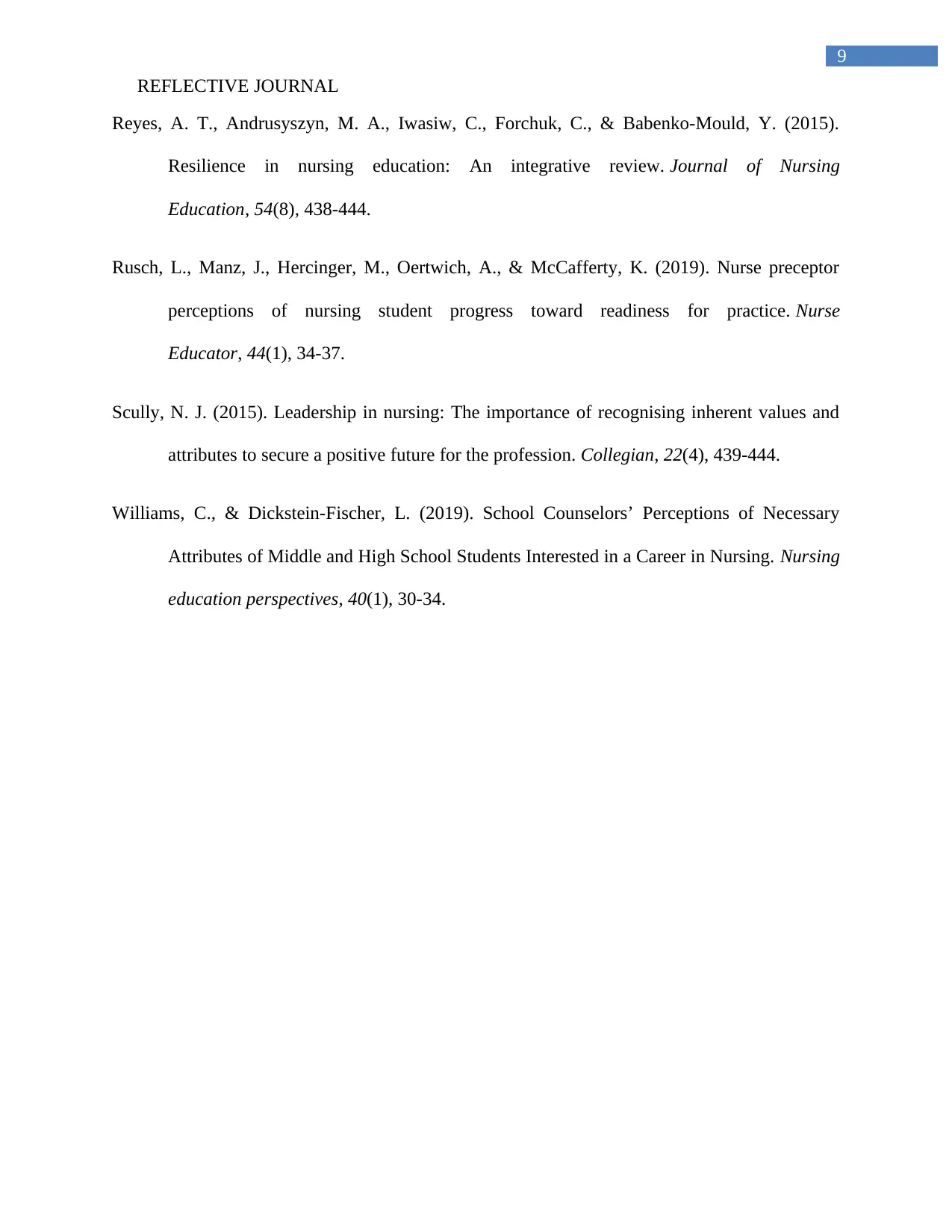
9
REFLECTIVE JOURNAL
Reyes, A. T., Andrusyszyn, M. A., Iwasiw, C., Forchuk, C., & Babenko-Mould, Y. (2015).
Resilience in nursing education: An integrative review. Journal of Nursing
Education, 54(8), 438-444.
Rusch, L., Manz, J., Hercinger, M., Oertwich, A., & McCafferty, K. (2019). Nurse preceptor
perceptions of nursing student progress toward readiness for practice. Nurse
Educator, 44(1), 34-37.
Scully, N. J. (2015). Leadership in nursing: The importance of recognising inherent values and
attributes to secure a positive future for the profession. Collegian, 22(4), 439-444.
Williams, C., & Dickstein-Fischer, L. (2019). School Counselors’ Perceptions of Necessary
Attributes of Middle and High School Students Interested in a Career in Nursing. Nursing
education perspectives, 40(1), 30-34.
REFLECTIVE JOURNAL
Reyes, A. T., Andrusyszyn, M. A., Iwasiw, C., Forchuk, C., & Babenko-Mould, Y. (2015).
Resilience in nursing education: An integrative review. Journal of Nursing
Education, 54(8), 438-444.
Rusch, L., Manz, J., Hercinger, M., Oertwich, A., & McCafferty, K. (2019). Nurse preceptor
perceptions of nursing student progress toward readiness for practice. Nurse
Educator, 44(1), 34-37.
Scully, N. J. (2015). Leadership in nursing: The importance of recognising inherent values and
attributes to secure a positive future for the profession. Collegian, 22(4), 439-444.
Williams, C., & Dickstein-Fischer, L. (2019). School Counselors’ Perceptions of Necessary
Attributes of Middle and High School Students Interested in a Career in Nursing. Nursing
education perspectives, 40(1), 30-34.
1 out of 10
Related Documents
Your All-in-One AI-Powered Toolkit for Academic Success.
+13062052269
info@desklib.com
Available 24*7 on WhatsApp / Email
![[object Object]](/_next/static/media/star-bottom.7253800d.svg)
Unlock your academic potential
Copyright © 2020–2026 A2Z Services. All Rights Reserved. Developed and managed by ZUCOL.



